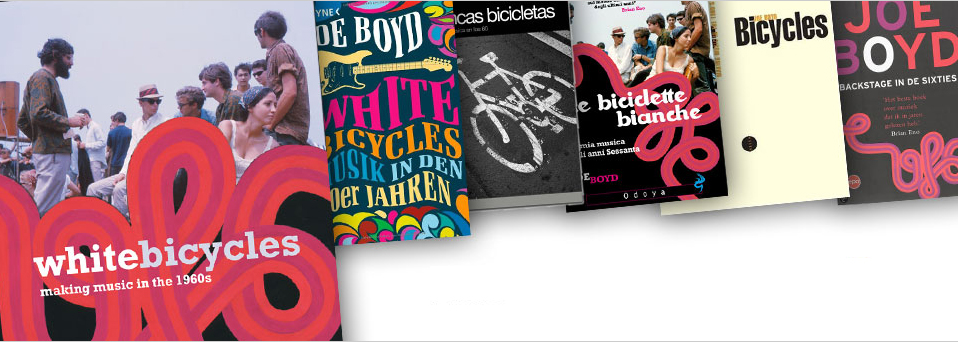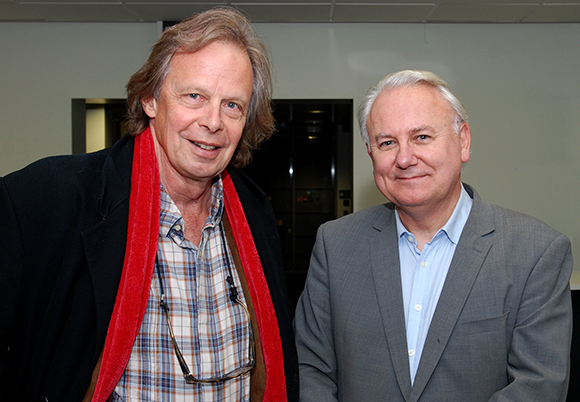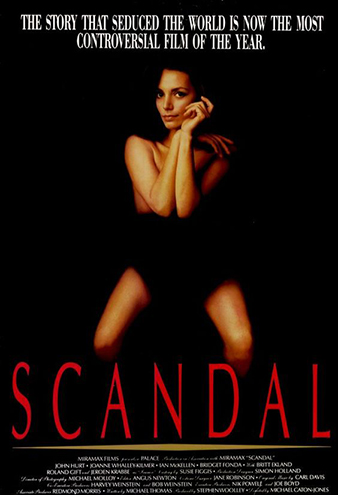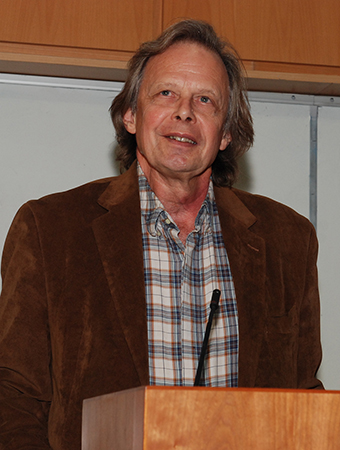“IT’S a badge of honour to be a relic of the Sixties!”

Fri, 02 Dec 2016 15:22:00 GMT
Record producer and writer Joe Boyd proclaims at the University’s first Annual Music Journalism Lecture
 ► Joe Boyd with the University’s lecture organiser Stephen Dorril
► Joe Boyd with the University’s lecture organiser Stephen Dorril
“IT’S a badge of honour to be a relic of the Sixties!” said the famous record and film producer Joe Boyd when he spoke at the University of Huddersfield.
The man who worked with many of the innovative groups and musicians that defined the decade – such as Pink Floyd in their early years – was delivering the University’s Annual Music Journalism Lecture and he provided a detailed analysis of 1960s culture and counter-culture as it evolved on both sides of the Atlantic. It was a decade that created “wonderful, original stuff”, he said.
“If you want to know whether the Sixties succeeded or had a lasting effect, one good way of judging this is by the tone of voice and the expression on the face of right-wing politicians when talking about the decade. They always get furious. They blame the Sixties for feminism, gay rights, environmentalism, civil rights – everything they don’t like!”
But he argued that the “forces of reaction that have been so angered by the Sixties have begun to get their revenge” – and cited developments such as the Brexit vote and the election of Donald Trump as U.S. President.
 Joe Boyd was producer of the 1988 film Scandal, dramatising the Profumo affair of 1963 – an episode that explained a lot about 1960s Britain, he told the audience. American-born, he came to the UK in 1964, as tour manager for the bluesman Muddy Waters, who had scarcely ever played to white audiences in the USA. But in Britain, white youngsters queued for his autograph.
Joe Boyd was producer of the 1988 film Scandal, dramatising the Profumo affair of 1963 – an episode that explained a lot about 1960s Britain, he told the audience. American-born, he came to the UK in 1964, as tour manager for the bluesman Muddy Waters, who had scarcely ever played to white audiences in the USA. But in Britain, white youngsters queued for his autograph.
“I thought that this is the place for me. I was elated to be here. Everybody was having so much fun. There was a sense of adventure and newness and that a huge weight had been lifted. The Profumo affair was part of that.”
Joe Boyd compared and contrasted the experience of the 1960s in Britain and the USA, which was confronted by bigger issues, he said, going to praise the “brilliance” of Prime Minister Harold Wilson who resisted pressure to join the “American military adventure” in Vietnam.
 Seminal episodes of the 1960s that were analysed by Joe Boyd included the 1965 Newport Folk Festival, when Bob Dylan outraged an older generation of political folk singers – their anthem was “We Shall Overcome” – by going electric. This was the start of the rock era, and the ideals of the early 1960s “now shifted to a search for personal fulfilment, personal enlightenment and getting stoned”.
Seminal episodes of the 1960s that were analysed by Joe Boyd included the 1965 Newport Folk Festival, when Bob Dylan outraged an older generation of political folk singers – their anthem was “We Shall Overcome” – by going electric. This was the start of the rock era, and the ideals of the early 1960s “now shifted to a search for personal fulfilment, personal enlightenment and getting stoned”.
Boyd described the British music scene, the importance of art school students who formed bands that began by playing American blues but then took new directions … and new drugs. This was symbolised by Syd Barrett of Pink Floyd, who began to see music as a performance art.
“One legacy of the 1960s is the capture of the high ground of popular music by the middle classes,” argued Joe Boyd, who produced early Pink Floyd tracks. In answer to an audience question, he gave a detailed account of the session that resulted in the 1967 Floyd single Arnold Layne.
For young people of the 1960s, the economy was entirely different, with city centre flats easily affordable on the basis of part-time jobs, said Joe Boyd, explaining a climate that led to musical experiment and creativity.
“There was no pressure about getting on the property ladder or the career ladder. The time, opportunity, mental space and lack of worry meant that you could create all this wonderful, original stuff that rattles around our culture to this day.”
- The Joe Boyd lecture was introduced by University of Huddersfield Senior Lecturer Dr Stephen Dorril, an author and journalist whose books include Honeytrap: The secret worlds of Stephen Ward, which probes the story of a figure at the heart of the Profumo affair, the basis for the film Scandal. Joe Boyd’s website is http://www.joeboyd.co.uk/.
- The Joe Boyd Annual Music Journsalism talk was part of the Sound.Vision.Place event services 2016/17. The next event is a lecture by political journalist Polly Toynbee on Wednesday 7 December 2016.







